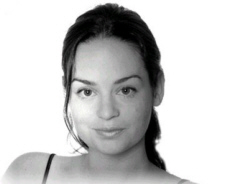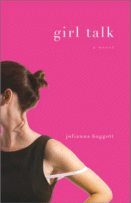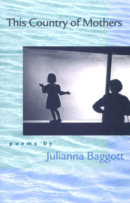Mothers Who Write: Julianna Baggott
by Cheryl Dellasega, Ph.D.
 |
--From From Girl Talk, A Novel by Julianna Baggott
Julianna Baggott does double duty as a poet and novelist, as well as triple duty with her children: oldest daughter Phoebe is six, son Phineas is four, and baby Theo is nearly one and a half. A resident of Newark, Delaware, Baggott appreciates the proximity of her parents, and it isn't hard to understand why.
When Julianna got a bachelor's degree in creative writing and French from Loyola University in Baltimore, her father called it "a degree in starvation and poverty." She is more philosophical, reflecting that at least she finally got to put her foreign language skills to use when she went to France to promote her book. An MFA from the University of North Carolina at Greensboro in 1991 further honed her writing skills.
Julianna began publishing stories while in graduate school for her MFA at the University of North Carolina at Greensboro where she was a Greensboro Scholar, studying fiction. Her work has appeared most recently in magazines such as Poetry, The Southern Review, Indiana Review, Quarterly West, Crab Orchard Review, and Cream City Review. Andrew Hudgins nominated her book for a prize sponsored by the Sewanee Writers' Conference.
Her collection of poems was a 1999 finalist in Kent State's first book contest and Middlebury College's Bakeless Prize through Bread Loaf, where she was awarded a scholarship to attend the Bread Loaf Writers' Conference for summer 2000. In the last two years, she has placed nearly thirty poems, in addition to publishing fiction. She's been awarded two fellowships from the Delaware Division of Arts, one in poetry and the other in fiction. Few of us will ever top her accomplishments in the year 2001: two of her books, one collection of poems and the other a novel, were published.
Her poetry, in This Country of Mothers: Crab Orchard Award Series in Poetry (Southern Illinois University Press, 2001), won the university's prestigious prize, which provided her with cash as well as publication. That book has currently gone into a second printing, which confirms the publisher's belief that poetry can be profitable. In addition to selling well, In This Country has garnered glowing reviews from an array of established poets. Linda Pastan, author of Carnival Evening: New and Selected Poems, 1968-1998,(W.W. Norton & Company, 1999), comments that: "Julianna Baggott has a fierce imagination which probes the ordinary details of a woman's life and lights up both the sacred and profane." Poet Andrew Hudgings describes her work as possessing "a full vision," and says that: "In these large, passionate, compelling poems, the speaker's family and the holy family merge in love and suffering -- wholly family, wholly loved, wholly suffered for." Another well-known poet, Rodney Jones (Elegy for a Southern Drawl, Houghton-Mifflin, 1999), comments that: "Against a backdrop of family stories, Julianna Baggott draws themes as sharp as razors. She is an accomplished poet of the eye and ear, of the definitive feminine experience, and her poems of private life are expansive enough to suggest a vision of a political and historical era."
Her novel, Girl Talk: A Novel, was also published by Simon & Schuster in 2001, and is currently being released overseas. Reviews for it were equally positive. Booklist says: "As much as this story is touching, Baggott's supporting characters succeed in making it funny and entertaining, as well. Publishers Weekly describes the book as: "a touching coming of age story, " while Poets and Writers notes that: "And it's Girl Talk -- that manages to be both funny and bleak, poignant and bitchy -- that will make Baggott famous." The New York Times review of her debut novel claims: "The title misleadingly suggests that this novel will have a good-natured, gossipy tone, but Baggott's brand of witty, psychological observation is dark and corrosive."
What inspired you to write?
 |
My first job was teaching grades six through eight after I graduated from college. The next year, I did odd jobs to support my writing, including ballroom dancing and raking leaves. It was another year and a half before I could start graduate school, which is where my first short story was published in Farmer's Market, a western literary journal.
After graduate school, I met my husband, who is a poet, and got married. We knew we wanted to have children and write, but we needed to be close to my family to do so. An artist's grant from Delaware enabled us to move back to my hometown, where I was soon pregnant and living below poverty level. My husband and I ended up taking in boarders and he worked as an editor, which gave him a lot of different skills (including the ability to design the cover of Girl Talk).
Still aspiring to reach poverty level, we did freelance work together for six months, and made good money. Our process was smooth: he would go out and get the story, come back, write it, and give it to me. I would add the finesse. That experience gave me a huge amount of confidence. By the time I decided to write a novel, I felt I could write anything. Around this same time, my husband got a job developing publications for a private school, which meant we finally had enough money to move into a bigger house and make an office in the living room, but we still couldn't afford babysitters.
After my second child was born, I began writing poetry, partly because my time shrank, and partly because I found my writing becoming more autobiographical. Being a mother and a daughter was a big theme for me. Then I became pregnant with my third child, was very sick, and had a miscarriage. During this time, I realized that when I'm upset, I write. I worked through a lot of grief in poetry. All the love I was preparing to lavish on a child, I lavished on my poems and novel.
How did you get an agent?
I had a short story collection but couldn't get a publisher interested, which was really frustrating. At my moment of despair, an agent called who had read my short story "Girl Talk" and discussed developing it into a novel. I wrote the first 50 pages, and he liked them.
How old were you children when you started to write?
I was writing long before they arrived! In fact, I had my own journal before I could write. I would dictate to my sisters what I wanted to write.
From a practical standpoint, how has being a mother affected your writing?

|
My kids are used to going to Kinko's and stuffing envelopes. Anything I can include them in, I do. When I was writing Girl Talk, I had a one and a half hour block of time I could count on when one was in preschool and the other napping. Of course, there needs to be family time too, so I used weekends to write. Not that children imprison me, but sometimes, I felt like a prisoner with a spoon. I could dig away, doing little bits at a time, hoping I would see the light. A small amount every day added up -- two pages a day, and in 30 days I had 60 pages.
I constantly think of what I can do here and there? I read while the kids play on the playground, and am very good at musing. Before I fall asleep I sort of untether myself mentally and think about what I want to work on the next day. I keep paper next to the bed.
We all went to the Breadloaf Writers Conference while I was still nursing. I had been nominated for a scholarship and applied. When I got accepted, we decided to go as a family. We rented a house nearby; everyday my husband would drop me off, and then he took the kids. When it was time, he would bring the baby in to nurse. We managed to muddle through. It was crazy but worthwhile. I also went to a writers colony at the Virginia Center for the Creative Arts which was very bucolic. I went in two week stints, just to write. When I was six months pregnant, I went to Ragdale writers colony in Lake Forrest outside of Chicago, but I wasn't as productive. I couldn't fall in love with writing because of being so concentrated on my pregnancy.
Does it make your children uncomfortable to have a mother who is a writer?
My oldest gets a little more frustrated. When all the hoopla for Girl Talk was going on she would get upset at times, and ask if we had to talk about the book so much. At my premier in Newark, she was there handing out cookies, though. My older son thinks everyone is a writer, since his parents are both writers, as are most of our friends.
In spite of the writing, our priority has always been to have one person at home. There was a time from February to May where I was on a big tour for Girl Talk and we had to get a sitter. We weren't living our priorities, which is why my husband decided to work from home. Still, it's very hard to do a tour with a family.
Has there ever been something from your child's life you wanted to write about but didn't for privacy reasons?
My poetry really reflects the kids. Girl Talk isn't about my kids. My second novel, The Miss America Family isn't about them either. But they're in the poetry.
Actually, my kids make their own books all the time. Phoebe loves stories, and draws pictures to go with them. My son is a narrator. There's the world and then there's what's going on in Phineas's head. He always has a story in his head.
How did your own mother influence you as a writer-if at all?
My mother was a concert pianist and a stay at home mom. My dad was an engineer and corporate lawyer. They were both very encouraging of my writing and having a creative life, but that runs in our family. My older sister is an actress, my brother is a musician who works with computers, and my other sister paints.
My third novel is called The Madame. It's based on my grandmother who was raised in a whorehouse. She had three kids she put in an orphanage. To understand how she could do this, I had to put myself in that position and my kids in that position. It's so very different from the way I am, the only way I could write about it was to project myself into her situation. So she influenced me in an indirect way.
Any other thoughts on how being a mother has influenced you as a writer?
Motherhood has helped me become a better writer for several reasons. I thought I had a depth before, but children mine that so much deeper. I have so much more love than I ever thought myself capable of. The success and failure of my writing often hinges on my ability to fall in love with it. That takes so much generosity, which children give you. They develop your capability to love. Being a mother brought me to a deeper level in my willingness to give to my characters and be aware of how much attention they needed.
Being a mom has also improved my concentration. The amount of time I wasted before I had kids astounds me now! That old saying, "If you want something done, ask someone who's busy" is really true for me. I've gotten so much better at a zen mindset, turning it on and off. Where I used to need a lot of time to get into a short story, I now juggle a huge to-do list and stay within a story as well.
Other kinds of jobs take up your musing time while filing, typing, etc., but with children, you can muse while nursing, chopping apples, or making peanut butter sandwiches. Rocking my youngest to sleep is good musing time for me. When Phoebe, my oldest, was born, I had to go away to a writers' colony after she was a year old because I couldn't write. With my second it was six months and poetry until I could write, then with my third it was five days.
What are you working on now?
My second novel The Miss America Family is the story of a former Miss New Jersey, the point of view of a 16 year old who is coming of age, like Girl Talk with bipolar disorder. I've also been doing some screenplays. Because my family stories are so complex, I actually wrote The Madame, my third book, as a screenplay first to get a handle on it.
What are your writing habits?
I have done a lot with writing groups off and on, which is especially helpful for poetry. I led a women's writing group for about five years until I wrote Girl Talk. My husband is always in groups too, but now, with him home at home, he reads my work. Sometimes what he says is brilliant but I don't realize it immediately.
Do you have any advice for other mothers/writers?
I try to be encouraging. Once I was in a chat room where I said writing was "doable," and a woman got upset with me, because she felt I was saying if you don't get it done you've failed. That made me feel really bad, because that's not what I meant.
Be kind to yourself. If it's not getting done, be gentle. Recognize your priorities. If it's not getting done, understand that it's okay. Wanting to be a writer is compatible with motherhood. Being an astronaut or lawyer with long hours wouldn't work, but writing can. Don't impose your schedule on them. The closer you can get to their natural rhythms the better your writing will be.
-- For more information about Julianna Baggott, or to check out some writing exercises, go to juliannabaggott.com.
**Cheryl Dellasega, Ph.D., is a mother, wife, writer, and Associate Professor of Medicine at Penn State University in Hershey, PA. Her book, Surviving Ophelia, will be published in Fall 2001 by Perseus Publishing.
More from Writers Write
Stephen King Quotes
quotes from the master
quotes from the master
Grammar Tips
improve your writing
improve your writing
Writing Prompts
spark your creativity
spark your creativity
